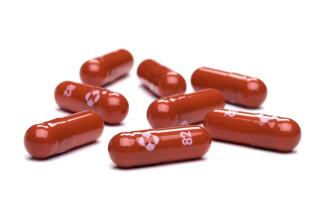Remdesivir has little effect on COVID-19 mortality, WHO study says

- Share via
LONDON — The COVID-19 treatment remdesivir has no substantial effect on a patient’s chances of survival, a clinical trial by the World Health Organization has found, delivering a significant blow to hopes of identifying existing medicines to treat the disease.
Results from the WHO’s highly anticipated Solidarity trial, which studied the effects of remdesivir and three other potential drug regimens in 11,266 hospitalized patients, found that none of the treatments “substantially affected mortality” or reduced the need to ventilate patients, according to a copy of the study seen by the Financial Times.
“These remdesivir, hydroxychloroquine, lopinavir and interferon regimens appeared to have little effect on in-hospital mortality,” the study found.
The results of the WHO trial also showed that the drugs had little effect on how long patients stayed in the hospital. However, WHO researchers said the study was primarily designed to assess the impact on in-hospital mortality. The study has not yet been peer-reviewed.
Remdesivir was one of a series of drugs used to treat President Trump after he tested positive for COVID-19. It was developed by U.S. drugmaker Gilead Sciences, initially as a potential medicine to treat Ebola.
Remdesivir received partial approval for use in the United States and the European Union after a trial by the U.S. National Institutes of Health in April showed that it cut the time to recover from COVID-19 from 15 days to 11. In July, Gilead released further data suggesting the treatment may reduce the likelihood of death, but that finding had not been confirmed in a randomized controlled trial — the gold standard for drug approval.
“We are aware that initial data from the World Health Organization’s Solidarity Trial has been made public prior to publication in a peer-reviewed journal,” Gilead said in response to a request for comment. “The emerging data appear inconsistent with more robust evidence from multiple randomized, controlled studies validating the clinical benefit of [remdesivir].”
The WHO declined to comment, saying the results of the study were not yet public.
The WHO’s findings mean that the only drug proven to increase COVID-19 survival rates is dexamethasone, a cheap steroid that can be taken orally and is widely available around the world. The WHO has recommended the use of steroids for patients with severe cases of COVID-19.
The Solidarity trial is one of the biggest ongoing studies of COVID-19 treatments. Drugs can be added or removed from the trial at any time. The results for the four drugs in the study seen by the Financial Times cover the period from March to the beginning of October.
The remdesivir arm of the trial involved 2,750 patients. Participants received the treatment for 10 days, with 200 mg delivered on the first day and 100 mg for the subsequent days.
Andrew Hill, a senior visiting research fellow at the University of Liverpool’s department of pharmacology, said a trial as large as Solidarity “would be expected to show a survival benefit [for the drug, if one existed].”
Earlier this month, the EU signed an agreement with Gilead to supply up to 500,000 treatment courses of the drug for European countries — including Britain — with an option to increase orders further.
Gilead has priced remdesivir at $2,340 per five-day course. Some public health experts have said the cost is too high for a drug that has not been proven to reduce the likelihood of death.
Final analysis of the NIH study of 1,062 patients, released last week in the New England Journal of Medicine, showed a decrease in hospital stays of about five days, from 15 to 10, but no significant mortality benefit for remdesivir.
© The Financial Times Ltd. 2020. All rights reserved. FT and Financial Times are trademarks of the Financial Times Ltd. Not to be redistributed, copied or modified in any way.
More to Read
Sign up for Essential California
The most important California stories and recommendations in your inbox every morning.
You may occasionally receive promotional content from the Los Angeles Times.










